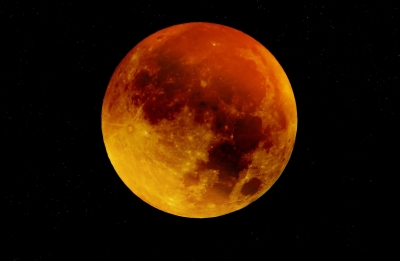
A total lunar eclipse will happen overnight Thursday, March 13, 2025. Nicknamed a "blood moon," lunar eclipses happen when the moon, the Earth, and the sun line up with the Earth in the middle, blocking the sun's rays from hitting the moon directly and casting a shadow on the moon's surface.
The result is a moon that appears yellow, orange, or red while behind the shadow of the Earth. Total lunar eclipses occur every few years, but their frequency can vary. Some years may have multiple eclipses, while others have none, and how much of the eclipse is visible depends on where you are.
Like a solar eclipse (when the moon passes between the sun and the Earth), lunar eclipses occur in stages, but the process takes much longer. The moon will be completely in Earth's shadow for about an hour in the middle of the night tonight, but the entire process will last several hours. If you stay up late, you can watch at least the start of the eclipse, and (unlike a solar eclipse), lunar eclipses can be viewed with the naked eye - no special glasses required!
- 10:57 pm - Penumbral Eclipse begins: The moon will enter the outer edge of Earth's shadow and start to dim slightly.
- 12:09 am - Partial Eclipse begins: The moon will enter the main core of Earth's shadow and will start to resemble a waxing or waning moon, with a crescent portion of the moon obscured (like someone has taken a bite out of it).
- 1:26 am - Total Eclipse begins: The moon will be completely in Earth's shadow. It will have a dark red-orange appearance.
- 2:31 am - Total Eclipse ends: The moon will start to exit Earth's shadow and the red color will start to fade. The "bite" missing from the moon will appear on the opposite side of the moon from the start of the eclipse.
- 3:47 am - Partial Eclipse ends: The entire moon will be out from behind Earth's main shadow, but it will still be in the shadow's outer edge.
- 5:00 am - Penumbral Eclipse ends: The moon will be completely out of Earth's shadow and will look like any other full moon.
Weather forecasters predict clear skies for Central Illinois tonight, so if you are up in the middle of the night, take a look out your window or step onto your porch to catch a glimpse of this somewhat rare phenomenon!
For more information on lunar eclipses, head to Explora Public Library or the Science Reference Source in our Digital Library.